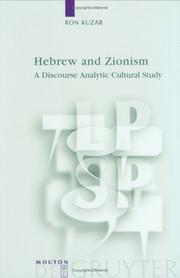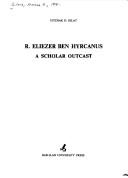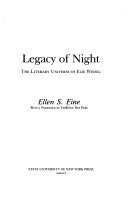| Listing 1 - 10 of 23 | << page >> |
Sort by
|
Book
ISBN: 3110879107 9783110879100 9027924953 9789027924957 9789027924957 Year: 1973 Publisher: The Hague : Mouton,
Abstract | Keywords | Export | Availability | Bookmark
 Loading...
Loading...Choose an application
- Reference Manager
- EndNote
- RefWorks (Direct export to RefWorks)
No detailed description available for "The Revival of Classical Tongue".
Jews --- Hebrew language --- Languages. --- History. --- Ben-Yehuda, Eliezer, --- Perlman, Eliezer Isaac, --- Ben Jehuda, Eliezer, --- Judah, Eliezer Ben-, --- Ben-Judah, Eliezer, --- Perelman, Eliezer, --- Yehudah, Eliezer Ben-, --- Jehuda, Eliezer Ben, --- Yehuda, Eliezer Ben-, --- Ilīʻīzar ibn Yahūdā, --- Ibn Yahūdā, Ilīʻīzar, --- Ben-Yehudah, Eliezer, --- Ben-Yéhouda, Eliézer, --- Yéhouda, Eliézer Ben-, --- בו יהודה, אליעזער --- בו יהודה, אליעזער, --- בן־יהודה, אליעזר --- בן־יהודה, אליעזרץ --- בן־יהודה, אליעזר, --- בן־יהודה, א., --- בן־יהודה, רליעזר,
Book
ISBN: 1282949381 9786612949388 9004180613 9789004180611 9789004170490 9004170499 Year: 2009 Publisher: Leiden ; Boston : Brill,
Abstract | Keywords | Export | Availability | Bookmark
 Loading...
Loading...Choose an application
- Reference Manager
- EndNote
- RefWorks (Direct export to RefWorks)
This study analyzes mythic narratives, found in the 8th century midrashic text Pirqe de-Rabbi Eliezer (PRE), that were excluded, or ‘repressed’, from the rabbinic canon, while preserved in the Pseudepigrapha of the Second Temple period. Examples include the role of the Samael (i.e. Satan) in the Garden of Eden, the myth of the Fallen Angels, Elijah as zealot, and Jonah as a Messianic figure. The questions are why these exegetical traditions were excluded, in what context did they resurface, and how did the author have access to these apocryphal texts. The book addresses the assumptions that underlie classic rabbinic literature and later breaches of that exegetical tradition in PRE, while engaging in a study of the genre, dating, and status of PRE as apocalyptic eschatology.
Rabbinical literature --- History and criticism. --- Pirkei de-Rabbi Eliezer. --- Bible.
Book
ISBN: 9655240797 9789655240795 9789655240290 9655240290 Year: 2009 Publisher: [Place of publication not identified] Urim
Abstract | Keywords | Export | Availability | Bookmark
 Loading...
Loading...Choose an application
- Reference Manager
- EndNote
- RefWorks (Direct export to RefWorks)
Orthodox Judaism --- Jewish law --- Soloveitchik, Joseph Dov --- Berkovits, Eliezer, --- Teachings.
Book
Year: 2017 Publisher: Leiden, Netherlands ; Boston, [Massachusetts] : Brill,
Abstract | Keywords | Export | Availability | Bookmark
 Loading...
Loading...Choose an application
- Reference Manager
- EndNote
- RefWorks (Direct export to RefWorks)
In Pirqei deRabbi Eliezer: Structure, Coherence, Intertextuality Katharina E. Keim offers a description of the literary character of Pirqei deRabbi Eliezer , an enigmatic work of the late-eighth-to-early-ninth centuries CE. Katharina E. Keim explores the work’s distinctive literary features through an analysis of its structure and coherence. These literary features, when taken together with the work’s intertextual relationships with antecedent and contemporaneous Christian and Jewish (rabbinic and non-rabbinic) texts, reveal Pirqei deRabbi Eliezer to be an innovative work, and throw light on a new turn in Jewish literature following the rise of Islam.
Pirkei de-Rabbi Eliezer --- Language, style. --- Criticism, Textual.

ISBN: 3110869497 9783110869491 3110169924 9783110169928 9783110169928 3110169932 9783110169935 3110169924 3111870685 Year: 2001 Volume: 5 Publisher: Berlin ; New York : Mouton de Gruyter,
Abstract | Keywords | Export | Availability | Bookmark
 Loading...
Loading...Choose an application
- Reference Manager
- EndNote
- RefWorks (Direct export to RefWorks)
This book observes and critiques controversies on the genesis and the character of Israeli Hebrew. Did it emerge through revival? Did Ben-Yehuda play a role in it? Is Hebrew a normal language now? The hegemonic ideology of the revival of Hebrew is shown to have been harmonious with various Zionist streams, as well as with its rival, Canaanism. The effects of revivalism are evaluated, and an argument is made in favor of non-revivalist alternatives in linguistics and in language education.
Hebrew language --- Zionism. --- Canaanites (Movement) --- Jews --- Zionist movement --- Jewish nationalism --- Jewish language --- Semitic languages, Northwest --- Revival. --- Political aspects. --- Identity --- Zionism --- Politics and government --- Restoration --- Languages --- Ben-Yehuda, Eliezer, --- Perlman, Eliezer Isaac, --- Ben Jehuda, Eliezer, --- Judah, Eliezer Ben-, --- Ben-Judah, Eliezer, --- Perelman, Eliezer, --- Yehudah, Eliezer Ben-, --- Jehuda, Eliezer Ben, --- Yehuda, Eliezer Ben-, --- Ilīʻīzar ibn Yahūdā, --- Ibn Yahūdā, Ilīʻīzar, --- Ben-Yehudah, Eliezer, --- Ben-Yéhouda, Eliézer, --- Yéhouda, Eliézer Ben-, --- בו יהודה, אליעזער --- בו יהודה, אליעזער, --- בן־יהודה, אליעזר --- בן־יהודה, אליעזרץ --- בן־יהודה, אליעזר, --- בן־יהודה, א., --- בן־יהודה, רליעזר,
Book
ISBN: 9004249796 9789004249790 9789004234840 9004234845 9789004235076 9004235078 Year: 2013 Publisher: Boston : Brill,
Abstract | Keywords | Export | Availability | Bookmark
 Loading...
Loading...Choose an application
- Reference Manager
- EndNote
- RefWorks (Direct export to RefWorks)
This volume features Eliezer Schweid’s philosophy of Judaism for a secular age. The volume brings together four of Schweid’s most original and influential philosophical essays and an interview with him that together express his fundamental outlook: the faith of a secular Jew, freely choosing loyalty to his or her national culture and drawing on Jewish heritage to inform how to act responsibly toward one’s neighbor, one’s people, the world, and God. The themes span the gamut of Schweid’s life work: the existential loneliness of the modern Jew; Judaism as a culture; faith in light of the Holocaust; and appreciation for secular humanism with awareness of its shortcomings, given the enduring legacy of the Jewish biblical heritage.
Jewish philosophy. --- Philosophy, Medieval. --- PHILOSOPHY / Eastern --- Medieval philosophy --- Scholasticism --- Jews --- Philosophy, Jewish --- Philosophy, Israeli --- Philosophy --- Schweid, Eliezer --- Shvaid, Eliʻezer --- Shvid, Eliʻezer --- Shweid, E. --- שביד, אליעזר --- שבייד, אליאזר --- שבייד, אליעזר --- שבייד, א. --- Teachings. --- Shvaid, Eliʻezer, --- Shvid, Eliʻezer, --- Schweid, Eliezer,
Book
ISBN: 0295801786 9780295801780 9780295991283 0295991283 9780295991290 0295991291 Year: 2011 Publisher: Seattle : University of Washington Press,
Abstract | Keywords | Export | Availability | Bookmark
 Loading...
Loading...Choose an application
- Reference Manager
- EndNote
- RefWorks (Direct export to RefWorks)
Make Yourself a Teacher is a teaching book and a book about teaching. It discusses three dramatic, well-known stories about the student and teacher Rabbi Eliezer ben Hyrcanus from the Oral Torah. The stories of R. Eliezer serve as teaching texts and models for reflection on the teacher/student relationship in the Jewish tradition and in contemporary culture with special emphasis on the hevruta mode of Jewish learning, a collaborative process that invites the reader into a dialogue with teachers past and present.Susan Handelman considers how teacher/student relations sustain and renew the Jewish tradition, especially during troubled times. As a commentary on historical and contemporary educational practices, she asks a range of questions about teaching and learning: What is it that teachers do when they teach? How do knowledge, spirituality, and education relate? What might Jewish models of study and commentary say about how we teach and learn today? Handelman not only presents pedagogical issues that remain controversial in today's debates on education but she also brings the stories themselves to life. Through her readings, the stories beckon us to sit among the sages and be their student
Spiritual life --- Rabbinical literature --- Jewish learning and scholarship. --- Teacher-student relationships --- Teacher-student relationships in rabbinical literature. --- Jews --- Learning and scholarship --- Judaism. --- History and criticism. --- Religious aspects --- Intellectual life --- Eliezer ben Hyrcanus. --- Eliʻezer ben Hurḳanos --- Eliʻezer, --- Eliezer, --- Hurḳanos, Eliʻezer ben --- Hyrcanus, Eliezer ben --- Hyrcanus, Liezer ben --- Liezer ben Hyrcanus --- אליעזר בן הורקנוס --- אליעזר בן הורקנוס, --- Eliʻezer ben Hurḳanos,

ISBN: 9652260436 9652660418 9789652660411 9789652260437 9652660264 9789652660268 Year: 2010 Publisher: Tel Aviv : Emery and Claire Yass Publications in Archaeology, Institute of Archaeology, Tel Aviv University,
Abstract | Keywords | Export | Availability | Bookmark
 Loading...
Loading...Choose an application
- Reference Manager
- EndNote
- RefWorks (Direct export to RefWorks)
Jewish law --- Religion --- Philosophy & Religion --- Judaism --- History --- Eliezer ben Hyrcanus. --- Eliʻezer ben Hurḳanos --- Eliʻezer, --- Eliezer, --- Hurḳanos, Eliʻezer ben --- Hyrcanus, Eliezer ben --- Hyrcanus, Liezer ben --- Liezer ben Hyrcanus --- אליעזר בן הורקנוס --- אליעזר בן הורקנוס, --- Eliʻezer ben Hurḳanos, --- Hittites. --- Hittite language. --- Hittites --- Festschriften. --- Luwian language. --- Religion. --- Hawkins, John David --- Turkey --- Antiquities. --- Luian language --- Lûish language --- Luvian language --- Anatolian languages --- Extinct languages --- Anniversary volumes --- Commemorative volumes --- Homage volumes --- Jubilee volumes --- Wedding publications --- Essays --- Chatti --- Kheta --- Khita --- Indo-Europeans --- Hawkins, J. D. --- Hawkins, J. David

ISBN: 1438402791 9781438402796 0873955897 9780873955898 0873955900 9780873955904 Year: 1982 Publisher: Albany : State University of New York Press,
Abstract | Keywords | Export | Availability | Bookmark
 Loading...
Loading...Choose an application
- Reference Manager
- EndNote
- RefWorks (Direct export to RefWorks)
Jews in literature. --- Holocaust, Jewish (1939-1945), in literature. --- Wiesel, Elie, --- Criticism and interpretation. --- Wiesel, Eliezer, --- Wiezel, Eli, --- Vizel, Eli, --- Weisel, Elie, --- Визель, Эли, --- וויזל, אליעזר --- וויזל, אליעזר, --- וויזל, אליעזר4 --- ווייזעל, אלי, --- וויסל, עליעזר --- ויזל, אלי --- ויזל, אלי,
Book
ISBN: 1438475470 1438475454 1438475462 Year: 2019 Publisher: Albany, New York : State University of New York Press,
Abstract | Keywords | Export | Availability | Bookmark
 Loading...
Loading...Choose an application
- Reference Manager
- EndNote
- RefWorks (Direct export to RefWorks)
"Elie Wiesel (1928-2016) was one of the most important literary voices to emerge from the Holocaust. The Nazis took the lives of most of his family, destroyed the community in which he was raised, and subjected him to ghettoization, imprisonment in Auschwitz and Buchenwald, and a death march. It is remarkable not only that Wiesel survived and found a way to write about his experiences, but that he did so with elegance and profundity. His novels grapple with questions of tradition, memory, trauma, madness, atrocity, and faith. The Struggle for Understanding examines Wiesel's literary, religious, and cultural roots and the indelible impact of the Holocaust on his storytelling. Grouped in sections on Hasidic origins, the role of the Other, theology and tradition, and later works, the chapters cover the entire span of Wiesel's career. Books analyzed include Night, Dawn, The Forgotten, The Gates of the Forest, The Town Beyond the Wall, The Testament, The Sonderberg Case, and Hostage. What emerges is a portrait of Wiesel's work in its full literary richness"--
Wiesel, Elie, --- Criticism and interpretation. --- Wiesel, Eliezer, --- Wiezel, Eli, --- Vizel, Eli, --- Weisel, Elie, --- Визель, Эли, --- וויזל, אליעזר --- וויזל, אליעזר, --- וויזל, אליעזר4 --- ווייזעל, אלי, --- וויסל, עליעזר --- ויזל, אלי --- ויזל, אלי,
| Listing 1 - 10 of 23 | << page >> |
Sort by
|

 Search
Search Feedback
Feedback About UniCat
About UniCat  Help
Help News
News